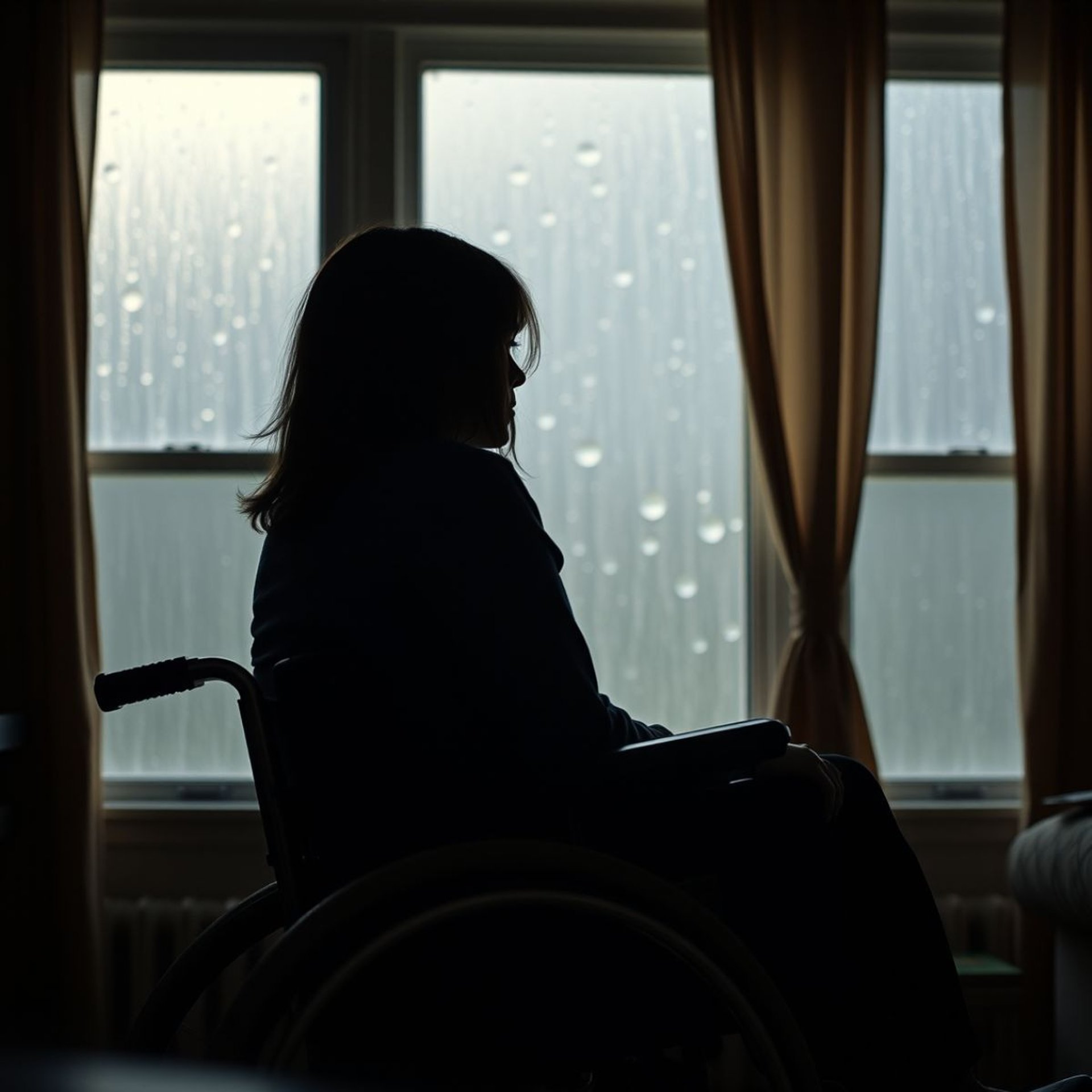
Managing Incontinence After Spinal Cord Injury: Essential Tips for Caregivers
Discover effective strategies and adaptive care techniques to manage bladder and bowel incontinence following a spinal cord injury (SCI). Learn how to maintain dignity, improve quality of life, and navigate the emotional challenges for both individuals with SCI and their caregivers.
INCONTINENCE CARE
Introduction
Living with a spinal cord injury (SCI) can bring about significant changes in daily living, including managing bladder and bowel functions. Incontinence is a common concern that affects many individuals with SCI, but there are various strategies to address these challenges effectively. This comprehensive guide will explore the best practices for bladder and bowel management, adaptive care techniques to reduce physical strain on both the individual and their caregivers, and ways to mitigate emotional stress in SCI caregiving.
Table of Contents


Anna watched the rain from her wheelchair, feeling isolated by incontinence. Weighed down by anxiety, she resolved to call her therapist, a step toward reclaiming her life.
Understanding the Impact of SCI on Bladder and Bowel Function
As a caregiver for a loved one with a spinal cord injury (SCI), managing incontinence can be a daunting task. The physical and emotional challenges that come with SCI can be overwhelming, but with the right strategies and support, individuals can maintain their quality of life and lead fulfilling lives despite this challenge.
The Neurological Connection: How SCI Affects Urinary & Digestive Systems
A spinal cord injury can disrupt the normal functioning of the bladder and bowel systems, leading to incontinence. The spinal cord plays a crucial role in controlling the muscles that regulate bladder and bowel function. When the spinal cord is damaged, these muscles can become weak or unresponsive, leading to loss of bladder and bowel control.
Types of Incontinence Associated with SCI: Urge, Stress, Overflow
There are three main types of incontinence associated with SCI: urge, stress, and overflow. Urge incontinence occurs when the bladder muscle contracts too frequently, causing a sudden need to urinate. Stress incontinence occurs when physical stress, such as coughing or sneezing, causes the bladder to leak. Overflow incontinence occurs when the bladder is not fully emptied, causing urine to leak out.
Physical and Emotional Challenges Faced by Individuals with SCI
Living with SCI can be physically and emotionally challenging. Individuals with SCI may experience anxiety, depression, and social isolation due to the loss of bladder and bowel control. It's essential to address these emotional challenges and provide support to individuals with SCI to improve their overall well-being.


Sarah stared at the puddle on her floor, frustration rising. Bladder control had been elusive since the accident. 'Just one more chance,' she whispered, holding her CIC kit.
Bladder Management Strategies for Spinal Cord Injuries
Clean Intermittent Catheterization (CIC): A Step-by-Step Guide
Clean intermittent catheterization (CIC) is a common bladder management strategy for individuals with SCI. CIC involves inserting a thin tube through the urethra to empty the bladder several times a day. Here's a step-by-step guide on how to perform CIC safely and effectively:
Wash your hands thoroughly with soap and water.
Use a sterile catheter and lubricant.
Insert the catheter slowly and gently through the urethra.
Empty the bladder completely.
Remove the catheter and clean the genital area.
Continuous Catheterization: When is it Necessary?
Continuous catheterization involves using a catheter to continuously drain the bladder. This method is often used for individuals with SCI who have difficulty emptying their bladder or have a high risk of urinary tract infections (UTIs).
Medications to Improve Bladder Control and Reduce Contractions
Medications such as anticholinergic drugs can help improve bladder control and reduce contractions. These medications work by relaxing the bladder muscle and reducing the frequency of contractions.
Botulinum Toxin Injections for Overactive Bladder
Botulinum toxin injections can help manage overactive bladder symptoms by reducing bladder contractions. These injections are typically administered through a cystoscope and can provide relief for several months.
Bowel Management Techniques After SCI
Dietary Adjustments for Regularity & Consistency
Dietary adjustments can help manage bowel regularity and consistency. A high-fiber diet can help promote regular bowel movements, while a low-fiber diet can exacerbate constipation.
Scheduled Bowel Movements: Establishing a Routine
Establishing a consistent bowel routine can help prevent accidents and improve overall bowel health. This can involve setting a regular time for bowel movements and using techniques such as abdominal pressure or digital stimulation to assist bowel evacuation.
Medications to Manage Bowel Function and Stimulate Evacuation
Medications such as laxatives and stimulants can help manage bowel function and stimulate evacuation. These medications work by softening stool or stimulating bowel movements.
Manual Stimulation Techniques (Digital Pressure, Abdominal Massage)
Manual stimulation techniques such as digital pressure and abdominal massage can help assist bowel evacuation. These techniques involve applying gentle pressure to the abdomen or rectum to stimulate bowel movements.


David discreetly adjusted his catheter bag, feeling self-conscious. He longed to be open about his condition but fear held him back. 'Maybe one day,' he thought.
Adaptive Care Practices for Incontinence Management
Lifestyle Modifications: Bathroom Breaks, Avoiding Irritants
Lifestyle modifications such as regular bathroom breaks and avoiding bladder irritants can help manage incontinence. This can involve avoiding foods and drinks that irritate the bladder, such as caffeine and spicy foods.
Strengthening Bladder Muscles Through Kegel Exercises
Kegel exercises can help strengthen bladder muscles and improve bladder control. These exercises involve contracting and releasing the pelvic muscles to strengthen the bladder muscle.
Assistive Devices to Aid in Mobility and Hygiene (e.g., Grab Bars)
Assistive devices such as grab bars can help improve mobility and hygiene for individuals with SCI. These devices can provide support and stability when using the bathroom or showering.
The Importance of a Multidisciplinary Approach
Collaboration with Healthcare Professionals: Urologists, Gastroenterologists
Collaboration with healthcare professionals such as urologists and gastroenterologists is essential for managing incontinence after SCI. These professionals can provide specialized care and guidance on bladder and bowel management.
Occupational Therapists for Adaptive Care Techniques & Home Modifications
Occupational therapists can help individuals with SCI adapt their living environment and daily routines to improve independence and safety. This can involve modifying the home to improve accessibility and providing adaptive equipment to aid in daily activities.
Dieticians to Create Personalized Meal Plans and Address Nutritional Needs
Dieticians can help create personalized meal plans to address nutritional needs and manage bowel function. This can involve providing guidance on dietary adjustments and supplements to promote regular bowel movements.
Supporting the Emotional Well-being of Individuals with SCI
Addressing Anxiety, Depression, Social Isolation Related to Incontinence
Addressing anxiety, depression, and social isolation related to incontinence is essential for improving overall well-being. This can involve providing emotional support and connecting individuals with SCI to support groups and counseling services.
Finding Support Groups for Sharing Experiences & Building Community
Finding support groups can help individuals with SCI connect with others who understand the challenges of living with SCI. These groups can provide a sense of community and support, helping individuals to cope with the emotional challenges of incontinence.
Resources for Caregivers and Patients
National Spinal Cord Injury Association (NSCIA) - Information & Advocacy
The National Spinal Cord Injury Association (NSCIA) provides information and advocacy for individuals with SCI and their caregivers. This organization offers resources and support on bladder and bowel management, as well as emotional well-being.
American Spinal Injury Association (ASIA) - Standards of Care & Research:
The American Spinal Injury Association (ASIA) provides standards of care and research on SCI. This organization offers resources and support on bladder and bowel management, as well as emotional well-being.
Local Rehabilitation Centers, Support Groups, and Community Programs
Local rehabilitation centers, support groups, and community programs can provide additional resources and support for individuals with SCI and their caregivers. These organizations can offer guidance on bladder and bowel management, as well as emotional well-being.
By following these strategies and seeking support, caregivers can help individuals with SCI manage incontinence and improve their overall quality of life. Remember, managing incontinence is a journey, and it's essential to be patient, understanding, and supportive throughout the process.
Rebecca lay in the doctor's office, nervous but hopeful for her Botox injection. It promised to relax her bladder muscles, offering a long-term solution and renewed dignity.


Curated Resources for Spinal Cord Injury (SCI) Management
This section provides a curated list of credible sources that support various aspects of spinal cord injury (SCI) management. It includes resources from recognized institutions, peer-reviewed articles, and expert publications that address both the physical and emotional challenges faced by individuals with SCI. These references cover bladder and bowel management strategies, emotional well-being, dietary considerations, and multidisciplinary care approaches. Each source has been chosen to offer valuable insights and practical advice for improving the quality of life for both individuals with SCI and their caregivers.
Bladder and Bowel Management
Mayo Clinic. “Neurogenic Bladder and Bowel Management.” Mayo Clinic, 2024.
Comprehensive information on how spinal cord injuries impact bladder and bowel function, including symptoms and management strategies.
Supports: Neurological connection and types of incontinence sections.
National Association for Continence. “Spinal Cord Injury and Incontinence.” NAFC, 2024.
Discusses the effects of spinal cord injuries on bladder and bowel control, detailing types of incontinence and their impact on daily life.
Supports: Understanding the impact of SCI and types of incontinence.
MSKTC. “Bladder Management Options After Spinal Cord Injury.” MSKTC, 2024.
Detailed strategies for bladder management, including clean intermittent and continuous catheterization.
Supports: Bladder management strategies and catheterization methods.
Cleveland Clinic. “Self-Catheterization (Clean Intermittent Catheterization).” Cleveland Clinic, 2024.
Step-by-step guide for performing clean intermittent catheterization safely and effectively.
Supports: Clean intermittent catheterization section.
Verywell Health. “Bladder Control: Medications for Urinary Incontinence.” Verywell Health, 2024.
Overview of medications for improving bladder control, including their mechanisms and side effects.
Supports: Medications for bladder management.
Cochrane. “Botulinum Toxin Injections for Overactive Bladder.” Cochrane, 2024.
Review of the effectiveness of botulinum toxin injections for managing overactive bladder.
Supports: Botulinum toxin injections section.
Emotional and Psychological Well-being
Flint Rehab. “Psychological Effects of Spinal Cord Injury & How to Manage Them.” Flint Rehab, 2021.
Explores psychological challenges like anxiety and depression in individuals with spinal cord injuries.
Supports: Physical and emotional challenges section.
Flint Rehab. “Emotional Effects of Spinal Cord Injury: Coping with Changes.” Flint Rehab, 2024.
Provides strategies for managing the emotional effects of incontinence and spinal cord injuries.
Supports: Supporting emotional well-being section.
Dietary and Nutritional Considerations
My Shepherd Connection. “Spinal Cord Injury Nutrition Info.” My Shepherd Connection, 2024.
Emphasizes the role of a fiber-rich diet and hydration in bowel regularity.
Supports: Dietary adjustments for bowel regularity and consistency.
Multidisciplinary Care
Brooks Rehabilitation. “Specialized Care for Spinal Cord Injury.” Brooks Rehabilitation, 2024.
Discusses specialized care and rehabilitation programs for spinal cord injuries.
Supports: Multidisciplinary approach and adaptive care practices sections.
American Nurse. “Caring for Patients with Spinal Cord Injuries.” American Nurse, 2024.
Covers comprehensive care for spinal cord injury patients, including bladder and bowel management techniques.
Supports: Bladder and bowel management techniques and multidisciplinary approach.
Scheduled Bowel Movements
Queensland Health. “Bowel Management for People with Spinal Cord Injury.” Queensland Health, 2024.
Guidelines on bowel management, including scheduled bowel movements and dietary adjustments.
Supports: Scheduled bowel movements and dietary adjustments sections.
Brain Injury Support. “Bowel Management for Individuals with Spinal Cord Injury.” Brain Injury Support, 2024.
Information on bowel management techniques, including manual stimulation and medications.
Supports: Manual stimulation techniques and medications for bowel management.
FAQ:
What are some effective methods for managing neurogenic bladder after an SCI?
Intermittent catheterization is a common method for managing neurogenic bladders, while medications like anticholinergics can help reduce spasms and increase bladder capacity. In some cases, Botox injections may be used to control bladder function.
How can individuals with SCI manage bowel incontinence?
A: A scheduled bowel program using digital stimulation or suppositories, along with a diet rich in fiber and adequate fluid intake, can help regulate bowel movements. Transanal irrigation is another effective method for managing bowel incontinence.
What are some adaptive care techniques to reduce physical strain on the caregiver?
Proper positioning during transfers and toileting, utilizing assistive devices like transfer boards or lifts, and employing skin integrity management practices can all help reduce physical strain.
How can I make my home more accessible for someone with SCI?
Modifications such as installing shower chairs, raised toilet seats, grab bars in the bathroom, and removing tripping hazards can create a safer and more accessible environment.
What are some ways to cope with the emotional toll of caring for someone with SCI?
Open communication between caregiver and individual, seeking support from groups or counseling services, and practicing self-care strategies can help prevent burnout.
Final Thoughts on Managing Incontinence After SCI
Managing incontinence after a spinal cord injury requires attention to both physical aspects and emotional well-being. By using effective bladder and bowel management strategies, adaptive equipment, and fostering open communication, quality of life can be improved for both individuals and caregivers.
Have you or someone you know experienced managing incontinence after an SCI? Share your experiences and tips in the comments below! Don't forget to spread awareness by sharing this article on social media with friends and family who might benefit from these insights.
Related Article
More for you



